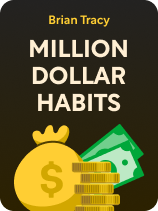

This article is an excerpt from the Shortform book guide to "Million Dollar Habits" by Brian Tracy. Shortform has the world's best summaries and analyses of books you should be reading.
Like this article? Sign up for a free trial here.
Why is financial independence important? Do you want to start being frugal and stop spending money on unnecessary purchases?
Brian Tracy argues that to become financially independent, you must cultivate drive and discipline. Lasting wealth is not built overnight—it requires patience, consistency, and living below your means.
Continue reading to learn how to reach financial independence.
How to Become Financially Independent
Why is learning how to reach financial independence important for you? Financial independence frees you from the stresses of living paycheck-to-paycheck and provides security for your future.
(Shortform note: The stress of poverty that Tracy describes is pervasive and severe. The constant stress of financial insecurity can trigger chronic anxiety and depression, as individuals grapple with the daily struggle to meet basic needs. This persistent state of stress can impair cognitive function, making it difficult to focus, plan, and make decisions effectively. Additionally, the stigma associated with poverty can erode self-esteem and foster feelings of shame and inadequacy.)
To start, create a habit of being frugal and avoiding extravagant purchases. This allows you to live within your means and direct money toward wealth-building activities like saving and investing. To put this into practice, carefully analyze each potential purchase: Ask yourself if it’s truly something you need, or just a passing want. Adopt a modest lifestyle focused on long-term financial goals over short-term indulgences.
(Shortform note: Improving your spending habits through pure willpower is difficult—if you could control your spending like that, you’d already be doing so. In Willpower Doesn’t Work, psychologist Benjamin Hardy says that the key to changing your behavior is to change your environment in ways that force you to adapt. In this case, you might try setting up safeguards that make it more difficult for you to spend money unnecessarily. For instance, clear your credit card information from your internet browser so you’re forced to enter it manually before each purchase, and leave your phone in another room while you’re at home so you’re not tempted to go shopping online when you’re bored.)
Tracy says another habit you should adopt is automatically saving 10% of your income. When you save automatically, you never have to factor that portion of your income into your lifestyle, so you learn to live within the other 90%. You can think of it as money you’re paying to a future you. Put this into action by setting up automatic transfers from your checking account into a dedicated savings account each payday. Treat this like another monthly bill you must pay.
If 10% of your current income feels like too much, consider saving 50% of any future income increases you receive. This gradually increases your savings rate without disrupting your current lifestyle—it’s easier psychologically to devote money you don’t have yet to savings, instead of taking a portion of what you already use. Implement this by calculating 50% of any raises or windfalls and immediately directing that amount into savings or investments.
(Shortform note: While saving 10% of your income is good financial advice, it’s not feasible for many low-income people (who would, in theory, benefit the most from such advice). In Evicted, sociologist Matthew Desmond explains that, to be financially secure, a family’s rent should be no more than 30% of their income. However, low-income families—at least in the US, where Desmond lives and works—often have to spend anywhere from 50% to 70% of their income on rent alone. This mismatch between income and cost of living makes it impossible to save money. Furthermore, people in that situation often aren’t able to accept raises because more income could cause them to lose their welfare benefits and end up in an even worse financial situation than before.)
Tracy adds that carefully considering your investment decisions is also paramount; good investments will grow your wealth year after year, but poor investments can quickly deplete it instead. Thoroughly research potential investments and consult successful investors for advice before committing money.
Finally, having proper insurance coverage is an additional expense, but a crucial one. Insurance safeguards your finances against catastrophic events that could otherwise wipe out your savings. Therefore, Tracy recommends protecting yourself and your family by obtaining appropriate insurance policies for your home, health, vehicles, and any other major assets or liabilities you have.
(Shortform note: In Antifragile, risk analyst Nassim Nicholas Taleb suggests a different approach to protecting and growing your wealth, which he calls the barbell model. Using this approach, you would keep most of your wealth (say, 90% of it) safe in a savings account and protected by insurance. Then, with the majority of your wealth secure, you’d use the rest for high-risk, high-return investments. The barbell model ensures that there’s a limit to how much you can lose—remember, most of your money is safely in the bank and your assets are protected by insurance—but there’s no limit to how much you can make from those volatile investments.)

———End of Preview———
Like what you just read? Read the rest of the world's best book summary and analysis of Brian Tracy's "Million Dollar Habits" at Shortform.
Here's what you'll find in our full Million Dollar Habits summary:
- How to achieve financial independence and a rewarding career
- The power of positive thinking in your personal and professional lives
- How avoiding salt, sugar, and white flour promotes a successful life






